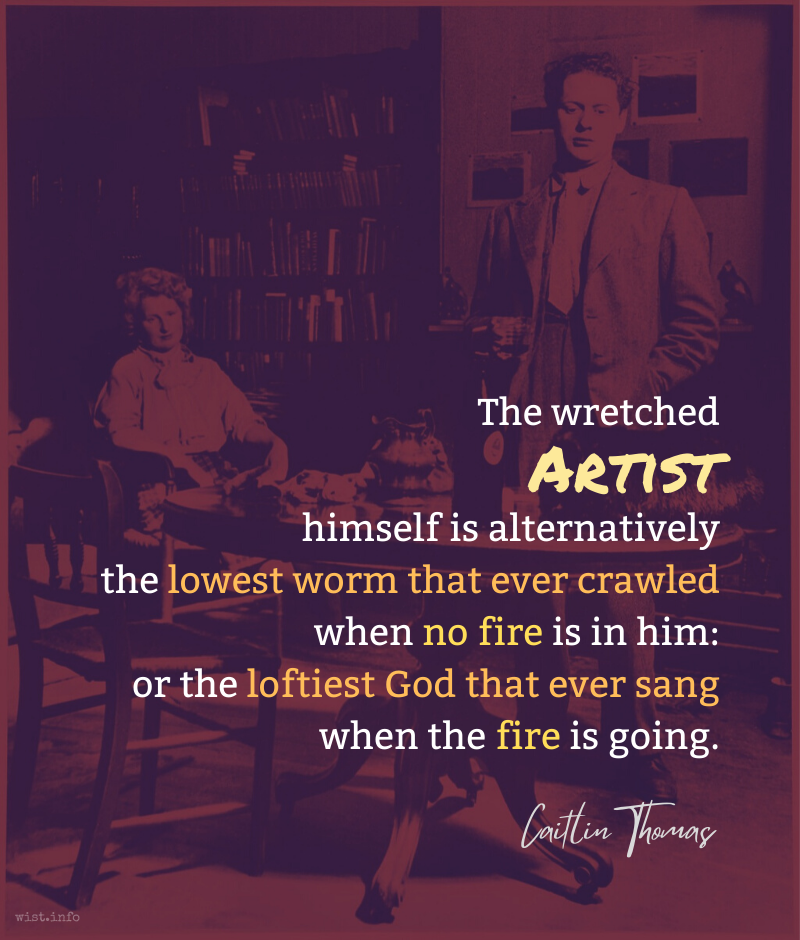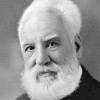CHORUS: O! for a muse of fire, that would ascend
The brightest heaven of invention!
A kingdom for a stage, princes to act,
And monarchs to behold the swelling scene!
Quotations about:
muse
Note not all quotations have been tagged, so Search may find additional quotes on this topic.
The most regretful people on earth are those who felt the call to creative work, who felt their own creative power restive and uprising, and gave to it neither power nor time.
The house of the bard Theodorus burned down!
What an insult, O Muses, to you!
The gods have done wrong:
For the credit of song
The bard — should have burned with it, too.
[Pierios vatis Theodori flamma penates
Abstulit. Hoc Musis et tibi, Phoebe, placet?
O scelus, o magnum facinus crimenque deorum,
Non arsit pariter quod domus et dominus!]Martial (AD c.39-c.103) Spanish Roman poet, satirist, epigrammatist [Marcus Valerius Martialis]
Epigrams [Epigrammata], Book 11, epigram 93 (11.93) (AD 96) [tr. Nixon (1911), “An Oversight”]
(Source)
"On Theodorus, a Bad Poet." (Source (Latin)). Alternate translations:
Flames Theodore's Pierian roofs did seize.
Can this Apollo, this the Muses, please?
O oversight of the gods! O dire disaster!
To burn the harmless house, and spare the master!
[tr. Killigrew (1695)]
Poor poet Dogrel's house consum'd by fire?
Is the muse pleas'd? or father of the lyre?
O cruel Fate! what injury you do,
To burn the house! and not the master too!
[tr. Hay (1755), ep. 94]
The poor poet Theodore's goods, in a flame,
Gave you, wicked Muses, and Phebus full glee.
Ye sov'rain disposers, what sin and what shame,
That holder and house so disparted should be!
[tr. Elphinston (1782), Book 3, ep. 49]
Fitzgerald's house hath been on fire -- the Nine
All smiling saw that pleasant bonfire shine.
Yet -- cruel Gods! Oh! ill-contrived disaster!
The house is burnt -- the house -- without the Master!
[tr. Byron (c. 1820); referencing Irish/British poet, William Thomas Fitzgerald (1759-1829)]
The flames have destroyed the Pierian dwelling of the bard Theodorus. Is this agreeable to you, you muses, and you, Phoebus? Oh shame, oh great wrong and scandal of the gods, that house and householder were not burned together!
[tr. Bohn's Classical (1859)]
The poetic abode of bard Theodorus a fire has destroyed. Does this please you, ye Muses, and you, Phoebus? Oh, what guilt, oh, what a huge crime and scandal of the gods is here! House and master did! House and master did not burn together!
[tr. Ker (1919)]
A poet’s house consumed by fire!
Phoebus and ye, the heavenly choir,
What vengeance will ye now require
For such a fell disaster?
How foul a deed, how black a shame!
Can men acquit the gods of blame
When they delivered to the flame
The house and not its master?
[tr. Pott & Wright (1921), "The Gods' Mistake"]
Where were ye, Muses, when in angry flame
Sank Pye's Pierian dwelling? Phoebus, shame!
Oh cruel sin, o scandal to the sky,
To bake the Pye-dish and forget the Pye!
[tr. Francis & Tatum (1924), ep. 634; referring to Henry James Pye (1745-1813), Poet Laureate of the UK]
Not a single trace remains
Of poet Theodorus' home.
Everything completely burned,
Every last poetic tome!
You Muses and Apollo too,
Now are you fully satisfied?
O monstrous shame that when it burned
The poet was not trapped inside!
[tr. Marcellino (1968)]
Flames have gutted th' abode Pierian
Of the wide-renowned poet Theodorus.
Didst thou permit this sacrilege, Apollo?
Where were ye, Muse's Chorus?
Ay me, I fondly sight, that was a crime,
A wicked deed, a miserable disaster.
Ye gods are much to blame: ye burnt the house
But failed to singe its master!
[tr. Wender (1980)]
Ted's studio burnt down, with all his poems.
Have the Muses hung their heads?
You bet, for it was criminal neglect
not also to have sautéed Ted.
[tr. Matthews (1992)]
Fire has consumed the Pierian home of poet Theodoras. Does this please the Muses and you, Phoebus? Oh crime, oh monstrous villainy and reproach to heaven! -- that house and householder did not perish together.
[tr. Shackleton Bailey (1993)]
Flames took the home of poet Theodorus.
Are the Muses and Phoebus pleased with this disaster?
What a great crime and insult to the gods
not to have burned together home and master!
[tr. McLean (2014)]
She became for me an island of light, fun, wisdom where I could run with my discoveries and torments and hopes at any time of day and find welcome.
May Sarton (1912-1995) Belgian-American poet, novelist, memoirist [pen name of Eleanore Marie Sarton]
A World of Light, ch. 4 (1976)
(Source)
Referring to Edith Forbes Kennedy (1890-1942), a long-time mentor and "muse."
If the desire to write is not accompanied by actual writing, then the desire must be not to write.
The wretched Artist himself is alternatively the lowest worm that ever crawled when no fire is in him: or the loftiest God that ever sang when the fire is going.
Caitlin Thomas (1913-1994) British author, wife of Dylan Thomas [née Macnamara]
Not Quite Posthumous Letter to My Daughter (1963)
(Source)
The writer, like a swimmer caught by an undertow, is borne in an unexpected direction. He is carried to a subject which has awaited him — a subject sometimes no part of his conscious plan. Reality, the reality of sensation, has accumulated where it was least sought. To write is to be captured — captured by some experience to which one may have given hardly a thought.
In relation to his public, the artist of to-day […] walks at first with his companions, till one day he falls through a hole in the brambles, and from that moment is following the dark rapids of an underground river which may sometimes flow so near the surface that the laughing picnic parties are heard above, only to re-immerse itself in the solitude of the limestone and carry him along its winding tunnel, until it gushes out through the misty creeper-hung cave which he has always believed to exist, and sets him back in the sun.
Cyril Connolly (1903-1974) English intellectual, literary critic and writer.
“Writers and Society, 1940-3” (1943), The Condemned Playground (1946)
(Source)
The art object is always passive in relation to its audience. It is alarmingly active, however, in relation to its creator. Far from being like a receptacle in which you, the artist, drop your ideas, and far from being like a lump of clay which you pummel until it fits your notion of an ashtray, the art object is more like an enthusiastic and ill-trained Labrador retriever which yanks you into traffic.
Annie Dillard (b. 1945) American author
Living by Fiction (1983)
(Source)
Often paraphrased, "Art is like an ill-trained Labrador retriever that drags you out into traffic."
Why do I write? I guess that’s been asked of every writer. I don’t know. It isn’t any massive compulsion. I don’t feel, you know, God dictated that I should write. You know, thunder rends the sky and a bony finger comes down from the clouds and says, “You. You write. You’re the anointed.” I never felt that. I suppose it’s part compulsion, part a channel for what your brain is churning up.
Rod Serling (1924-1975) American screenwriter, playwright, television producer, narrator
“Rod Serling: The Facts of Life,” Interview with Linda Brevelle (4 Mar 1975)
(Source)
You advise me, too, not to stray far from the ground of experience, as I become weak when I enter the region of fiction; and you say, “real experience is perennially interesting, and to all men.” I feel that this also is true; but, dear Sir, is not the real experience of each individual very limited? And, if a writer dwells upon that solely or principally, is he not in danger of repeating himself, and also of becoming an egotist? Then, too, imagination is a strong, restless faculty, which claims to be heard and exercised: are we to be quite deaf to her cry, and insensate to her struggles? When she shows us bright pictures, are we never to look at them, and try to reproduce them? And when she is eloquent, and speaks rapidly and urgently in our ear, are we not to write to her dictation?
The inventor … looks upon the world and is not contented with things as they are. He wants to improve whatever he sees, he wants to benefit the world; he is haunted by an idea. The spirit of invention possesses him, seeking materialization.
Write while the heat is in you. When the farmer burns a hole in his yoke, he carries the hot iron quickly from the fire to the wood, for every moment is less effectual to penetrate (pierce) it. It must be used instantly or it is useless. The writer who postpones the recording of his thoughts uses an iron which has cooled to burn a hole with. He cannot inflame the minds of his audience.
Songwriting is about getting the demon out of me. It’s like being possessed. You try to go to sleep, but the song won’t let you. So you have to get up and make it into something, and then you’re allowed to sleep. It’s always in the middle of the bloody night, or when you’re half-awake or tired, when your critical faculties are switched off. So letting go is what the whole game is.
The Muse was suddenly there for Dad.
The Truth lay easy in his mind.
The Subconscious lay saying its say, untouched, and flowing off his tongue.
As we must learn to do in our writing.
As we can learn from every man or woman or child around us when, touched and moved, they tell of something they loved or hated this day, yesterday, or some other day long past. At a given moment, the fuse, after sputtering wetly, flares and the fireworks begin.
Oh, it’s limping crude hard work for many, with language in their way. But I have heard farmers tell about their very first wheat crop on their first farm after moving from another state, and if it wasn’t Robert Frost talking, it was his cousin, five times removed. I have heard locomotive engineers talk about America in the tones of Thomas Wolfe who rode our country with his style as they ride it in their steel. I have heard mothers tell of the long night with their firstborn when they were afraid that they and the baby might die. And I have heard my grandmother speak of her first ball when she was seventeen. And they were all, when their souls grew warm, poets.Ray Bradbury (1920-2012) American writer, futurist, fabulist
“How to Keep and Feed a Muse,” The Writer (1961-07)
(Source)
Reprinted in Bradbury, Zen in the Art of Writing (1990).
There is a popular hallucination that makes of authors a romantic people who are entirely dependent upon moods and moments of inspiration for the power to labor in their peculiar way. Authors are supposed to write when they “feel like it,” and at no other time. Visions of Byron with a gin-bottle at his side, and a beautiful woman hanging over his shoulder, dashing off a dozen stanzas of Childe Harold at a sitting, flit through the brains of sentimental youth. We hear of women who are seized suddenly by an idea, as if it were a colic, or a flea, often at midnight, and are obliged to rise and dispose of it in some way. We are told of very delicate girls who carry pencils and cards with them, to take the names and address of such angels as may visit them in out-of-the-way places. We read of poets who go on long sprees, and after recovery retire to their rooms and work night and day, eating not and sleeping little, and in some miraculous way producing wonderful literary creations. The mind of a literary man is supposed to be like a shallow summer brook, that turns a mill. There is no water except when it rains, and the weather being very fickle, it is never known when there will be water. Sometimes, however, there comes a freshet, and then the mill runs night and day, until the water subsides, and another dry time comes on.
Now, while I am aware, as every writer must be, that the brain works very much better at some times than it does at others, I can declare without reservation, that no man who depends upon moods for the power to write can possibly accomplish much. I know men who rely upon their moods, alike for the disposition and the ability to write, but they are, without exception, lazy and inefficient men. They never have accomplished much, and they never will accomplish much.
J. G. Holland (1819-1881) American novelist, poet, editor [Josiah Gilbert Holland; pseud. Timothy Titcomb]
Lessons in Life, Lesson 1 “Moods and Frames of Mind” (1861) [as Timothy Titcomb]
(Source)





















